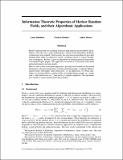Information theoretic properties of Markov Random Fields, and their algorithmic applications
Author(s)
Hamilton, Linus Ulysses; Koehler, Frederic; Moitra, Ankur
Download6840-information-theoretic-properties-of-markov-random-fields-and-their-algorithmic-applications.pdf (316.0Kb)
PUBLISHER_POLICY
Publisher Policy
Article is made available in accordance with the publisher's policy and may be subject to US copyright law. Please refer to the publisher's site for terms of use.
Terms of use
Metadata
Show full item recordAbstract
Markov random fields are a popular model for high-dimensional probability distributions. Over the years, many mathematical, statistical and algorithmic problems on them have been studied. Until recently, the only known algorithms for provably learning them relied on exhaustive search, correlation decay or various incoherence assumptions. Bresler [1] gave an algorithm for learning general Ising models on bounded degree graphs. His approach was based on a structural result about mutual information in Ising models. Here we take a more conceptual approach to proving lower bounds on the mutual information. Our proof generalizes well beyond Ising models, to arbitrary Markov random fields with higher order interactions. As an application, we obtain algorithms for learning Markov random fields on bounded degree graphs on n nodes with r-order interactions in n r time and log n sample complexity. Our algorithms also extend to various partial observation models.
Date issued
2016-05Department
Massachusetts Institute of Technology. Department of Electrical Engineering and Computer Science; Massachusetts Institute of Technology. Department of MathematicsJournal
Advances in neural information processing systems
Citation
Hamilton, Linus, Fredderic Koehler and Ankur Moitra. "Information Theoretic Properties of Markov Random Fields, and their Algorithmic Applications." Advances in Neural Information Processing Systems 30 (NIPS 2017).
Version: Final published version
ISSN
1049-5258